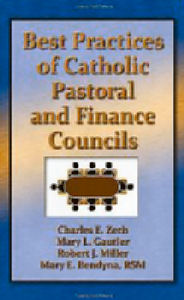
|
Posted November 12, 2010
Book: Best Practices of Catholic Pastoral and Finance Councils Authors: Charles E. Zech, Mary L. Gautier, Robert J. Miller, Mary E. Bendyna, RSM Our Sunday Visitor, Huntington, IN. 2010. Pp. 159 An Excerpt from the Jacket:
These councils are among the most important but least understood structures in the Catholic Church. Mandated to exist, their roles have become increasingly critical as parishes — both large and small — are stretching personnel and financial resources further and further each year. Add in the need for internal financial controls and human resource management coupled with fewer and fewer parish priests, and the importance of these councils goes way beyond simply filling seats with warm-bodied volunteers. The function of these councils is to provide consultation to the pastor and to promote greater participation of the entire parish in the life and mission of the Church. But in reality, these terms are vague and leave too much room for individual interpretation. In an unprecedented research effort, author Charles Zech explores the very function of these councils in an effort to lay the groundwork for best practices at every parish. It systematically fills the void as both Church leaders and laity strive to better understand the structure and processes needed to improve their effectiveness. Zech’s common-sense, straightforward writing style unpacks the extensive data to cover critical issues such as: Parish leadership Education/formation programs Communication with Parish and Parish staff Council guidelines manuals Internal controls Long-term planning Prayer and faith-sharing An Excerpt from the Book: 1. Honest and capable employees. Nearly all embezzlements have been committed by individuals who have been granted a great deal of trust. If a person is dishonest, even the best control system might not perform properly. Among the recommendations listed are: Require annual vacations to ensure that any fraud requiring a staff member’s constant attention could be discovered. Establish and educate staff on conflict-of-interest policies. Watch for signs that a staff member is spending more than his/her salary would typically permit. Many times embezzlement occurs to feed an addition (e.g. gambling, alcohol) or when individuals find themselves in serious debt. . . .Independent verification of performance. Procedures need to be in place to reconcile actual transactions that have been recoreded. . . .Physical control over assets and accounting records. Accounting records should be protected by physical barriers, such as locked drawers. Access to computer equipment and solfware should be controlled and backup files stored off-site. Physical assets, such as furniture or equipment, should be numbered and inventoried. Table of Contents: 1. Introduction to study of consultative councils 2. What we already know about parish pastoral councils and parish finance councils. 3. Methodology of the study and descriptive information about parish pastoral councils and parish finance councils. 4. Parish internal financial controls 5. Relationships and communication 6. Effective group processes in advisory councils 7. Recommendations |
|
